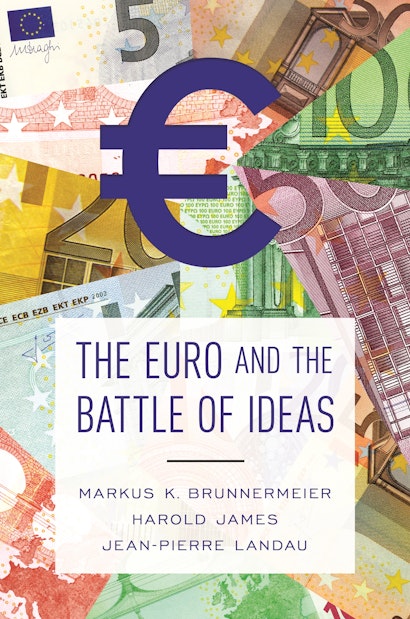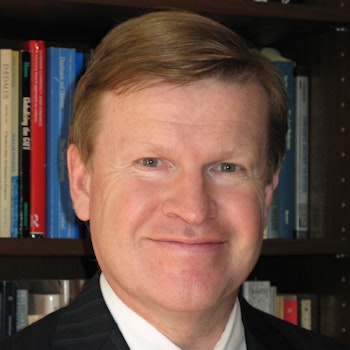Why is Europe’s great monetary endeavor, the Euro, in trouble? A string of economic difficulties in Greece, Ireland, Spain, Italy, and other Eurozone nations has left observers wondering whether the currency union can survive. In this book, Markus Brunnermeier, Harold James, and Jean-Pierre Landau argue that the core problem with the Euro lies in the philosophical differences between the founding countries of the Eurozone, particularly Germany and France. But the authors also show how these seemingly incompatible differences can be reconciled to ensure Europe’s survival.
As the authors demonstrate, Germany, a federal state with strong regional governments, saw the Maastricht Treaty, the framework for the Euro, as a set of rules. France, on the other hand, with a more centralized system of government, saw the framework as flexible, to be overseen by governments. The authors discuss how the troubles faced by the Euro have led its member states to focus on national, as opposed to collective, responses, a reaction explained by the resurgence of the battle of economic ideas: rules vs. discretion, liability vs. solidarity, solvency vs. liquidity, austerity vs. stimulus.
Weaving together economic analysis and historical reflection, The Euro and the Battle of Ideas provides a forensic investigation and a road map for Europe’s future.
Awards and Recognition
- Winner of the 2017 Gold Medal in International Business / Globalization, Axiom Business Book Awards
- One of Bloomberg’s Best Books of 2017
- One of Project Syndicate’s Best Reads in 2017 (chosen by Jean Pisani-Ferry)
- One of Bloomberg’s Best Books of 2016
- One of Financial Times (FT.com) Best Economics Books of 2016
- One of The Economist’s Economics and Business Books of the Year 2016
"If we turn to The Euro and the Battle of Ideas by Markus K. Brunnermeier, Harold James, and Jean-Pierre Landau, we start to find an explanation. The three authors are, respectively, a German academic economist, an English economic historian, and a French banker turned economics professor, and their book is an attempt to explain the euro's ideological and historic background. They explore the dichotomy between French and German political-economic philosophies. The first values flexibility and solidarity and state intervention; the second stresses rules and consequences and free markets."—John Lanchester, New Yorker
"In The Euro and the Battle of Ideas, the economists Markus Brunnermeier, Harold James, and Jean-Pierre Landau turn a sharp lens on the basic divide between France and Germany."—Rana Foroohar, New York Review of Books
"A book of depth and subtlety that is helpful in understanding matters well outside the questions it seems to address…. This is a fascinating and informative book."—Geoffrey Wood, Central Banking Journal
"[The authors] have the advantage of being deeply involved. . . . If Europe is high on your list of concerns, you should read this book; European leaders will."—David Warsh, Economic Principals
"[The Euro and the Battle of Ideas] demonstrates the value of sophisticated syntheses of policy analysis and intellectual history."—Foreign Affairs
"Markus Brunnermeier, Harold James and Jean-Pierre Landau have just published a fascinating book, The Euro and the Battle of Ideas, in which they bring together their respective skills in economic theory, economic history and economic policy to bear on one of the most important macroeconomic problems of our times—the rules versus discretion debate. Anyone who has studied this debate—and that's just about anyone who has taken a course in economics—would benefit from reading this book."—Economics One
"An exhaustive and original coverage of the working and difficulties of the euro zone in recent decades. . . . This book is worth reading. It mixes in a thorough way general concepts, economic facts and theories, as well as significant factual episodes in the recent economic and political history of the euro zone."—Jean-Christophe Poutineau, Economic Record
"A very comprehensive and very well written overview of the Euro crisis."—Ivo Maes, History of Economic Ideas
"The advent of the Euro is a singular event in monetary history. This is the best and most important book so far on an experiment with profound economic and geopolitical implications."—Lawrence H. Summers, former Secretary of the U.S. Treasury
"I very much appreciate this book's efforts to explain the highly diverse approaches to economic and fiscal policy in Europe and to shape them into a common strategy. If this could succeed in reality in today's Europe, much would be gained indeed."—Wolfgang Schäuble, Finance Minister of Germany
"International divergences in economic policy are as much the result of differences in intellectual frameworks as of variation in economic circumstances. This valuable book explains the critical differences in national economic philosophies and how they have conditioned policy choices over the past decade."—Ben S. Bernanke, former Chairman of the U.S. Federal Reserve
"Europeans have lost their sense of direction. Most demand increased sovereignty without considering what it takes to live under the same roof. Another cause of disaffection is that interests have diverged so much that we are no longer behind the veil of ignorance. This book offers a complementary, brand-new, third angle on the crisis of European institutions: cultural differences between France and Germany that developed following World War II. Nations interpret their interests through the lens of their worldview. This exciting historical, sociological, and psychological fresco, which also covers the visions of other countries and multilateral organizations, is a must-read for all who want to understand where Europe is heading—and how worldviews can get in the way of international cooperation."—Jean Tirole, Nobel Laureate in Economics
"This rich and articulate work is an important addition to the existing books about the Eurozone crisis. The authors identify the core intellectual and political differences framing the debate regarding the institutional developments required for Eurozone survival."—Giancarlo Corsetti, University of Cambridge



